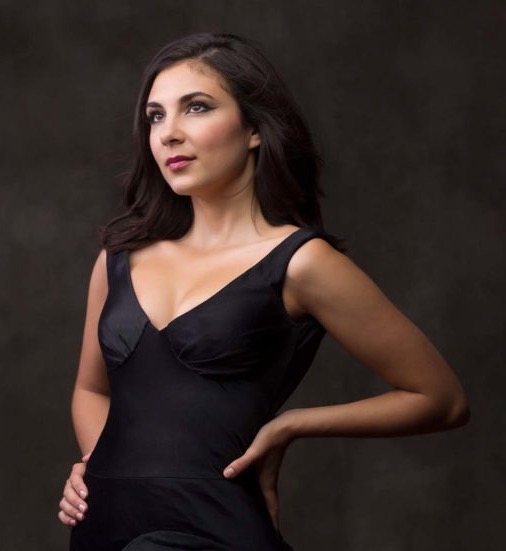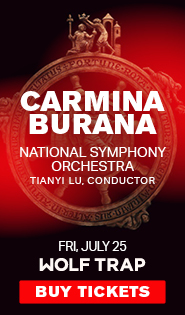Elena Villalón displays striking talent in Vocal Arts debut

Elena Villalón performed a recital Tuesday night at the Kennedy Center for Vocal Arts DC. Photo: Fay Fox
Each year Vocal Arts DC presents the Gerald Perman Emerging Artist Recital, named in honor of the group’s beloved founder.
Soprano Elena Villalón, in her third year as a studio artist at Houston Grand Opera, did the honors Tuesday evening in a splendid concert with pianist Kathleen Kelly at the Kennedy Center Terrace Theater. Villalón made her Washington debut fresh off a run of Jonathan Dove’s Flight at Dallas Opera, where she was favorably reviewed.
From this performance it was easy to see why. Villalón opened with a Swedish folk song, “Som stjärnan uppå himmelen så klar,” but not in an arrangement with piano accompaniment. Singing alone, she revealed a voice with considerable warmth and mellifluous legato tone, but also weight and breadth applied judiciously. A final partial repeat of the tune, hummed sweetly, sealed the impression of comfort and ease, a radiance in which one could simply bask contentedly.
After such a beginning, the usual establishment of song recital bona fides came easily. The first half featured a range of languages, all sung with clear diction and musicality. Villalón gave a spring-like bounce to Hugo Wolf’s “Frühling übers Jahr,” assisted by Kelly’s perky touch at the piano, which supported some effervescent high A’s. Kelly’s buzzing trills provided the bee portion of the shimmering dialogue with an amorous young man in the same composer’s “Der Knabe und das Immlein.”
“Ganymede” was the highlight of four Wolf songs, set to Goethe’s poem about the boy stolen away by Zeus to be his cup-bearer in the heavens. Often interpreted as referring to the soul that acquiesces willingly to God, the song received luminous high notes as Villalón’s voice seemed borne up on a cloud, floating in love and trust. Kelly gave a convincing rendition of the enigmatic sounds of an Aeolian harp in Wolf’s “An eine Äolsharfe.”
Sibelius’s enigmatic “En slända” featured steady alternation of piano and voice, mostly each without the other. Villalón increased the intensity of three successive vocalises (“Aa!”), admirably evoking the wonder of the narrator inspired by a dragonfly. A pair of Rachmaninoff songs added a tragic note, especially the weeping willow of “In my garden at night,” evoked by the melancholy tone of Villalón’s plangent voice.
The first half concluded with two songs that featured climactic crescendos of sound, beginning with Rachmaninoff’s “Dream,” in which Kelly’s accompaniment broadened like sleep’s spreading wings. The dream became a rapturous reality in Edvard Grieg’s “Ein Traum,” again with a perfectly paced build-up, through a pages-long stringendo and crescendo, to an ecstatic A-flat at the song’s conclusion.
Villalón, who is Cuban-American, started the second half with the world premiere of Migrare Mutare, a compact song cycle by Venezuelan-American composer Reinaldo Moya. The words, by Mexican-American poet Rossy Lima, captured the sense of life change that comes with migration. Moya’s harmonic style, largely tonal but with unexpected twists and dissonances, gave a biting backdrop to the “serpent woman” described in “Serpiente.”
The woman became a butterfly (“Monarch woman”) in “Mariposa,” which elicited a more tense mood from Moya (“You are the only death that promises wings”), with Kelly’s right hand giving unpredictable flight to a fluttering motif. Moya’s reserved, polished melodic style and flowing, uninterrupted accompaniments evoked the French songs of Gabriel Fauré, without ever seeming derivative. The cycle came full circle with a look backward by the children of immigrants in the third song “Si hay futuro.”
Villalón remained in Spanish, which she pronounced and sang impeccably, for the rest of the recital. Alberto Ginastera’s “Cancion al arbol del olvido” set a somewhat surrealistic poem with a melody of folk-like simplicity, while Kelly’s austere left-hand ostinato set an anxious tone. The mood remained pensive with “Con amores, la mia madre,” the first of three charming songs by Fernando Obradors. A surprise switch to F major at the end of this song featured a limpid high A from Villalón.
The equally reflective “¿Corazón, porqué pasáis…” ended in a long, musing vocalise, capping a curious anonymous poem about a lover lying awake at night. In the faster song “Molondrón,” Villalón echoed the narrator’s surprise at losing her skirts, her handkerchief, and “something that now I don’t remember,” with charming innocence. In an example of life imitating art, one of the beads randomly popped off her green gown.
Two more popular ballads concluded the program. Villalón interpreted the first, Ernesto Lecuona’s “María La O,” with admirable subtlety, even on the big-throated refrain. She was less reserved in Ruperto Chapí’s “Carceleras,” from his zarzuela Las hijas del Zebedeo, a fast-paced romp sung by the character Luisa, praising her lover. The encore, “Júrame” by Mexican composer María Grever, remained in the same fiery vein.
Vocal Arts DC presents mezzo-soprano Jamie Barton and pianist Jake Heggie in songs by Purcell, Schubert, Brahms, Price, and Heggie 7:30 p.m. April 6. vocalartsdc.org



Posted May 15, 2022 at 12:23 pm by María E. ESTAÚN
Brilliant! Unbelievable! Marvelous voice! Fantastic performance!
MORE OF THIS YOUNG SOPRANO !!!♥️
A BRILLIANT FUTURE AWAITS ELENA VILLALON ❣️❣️❣️